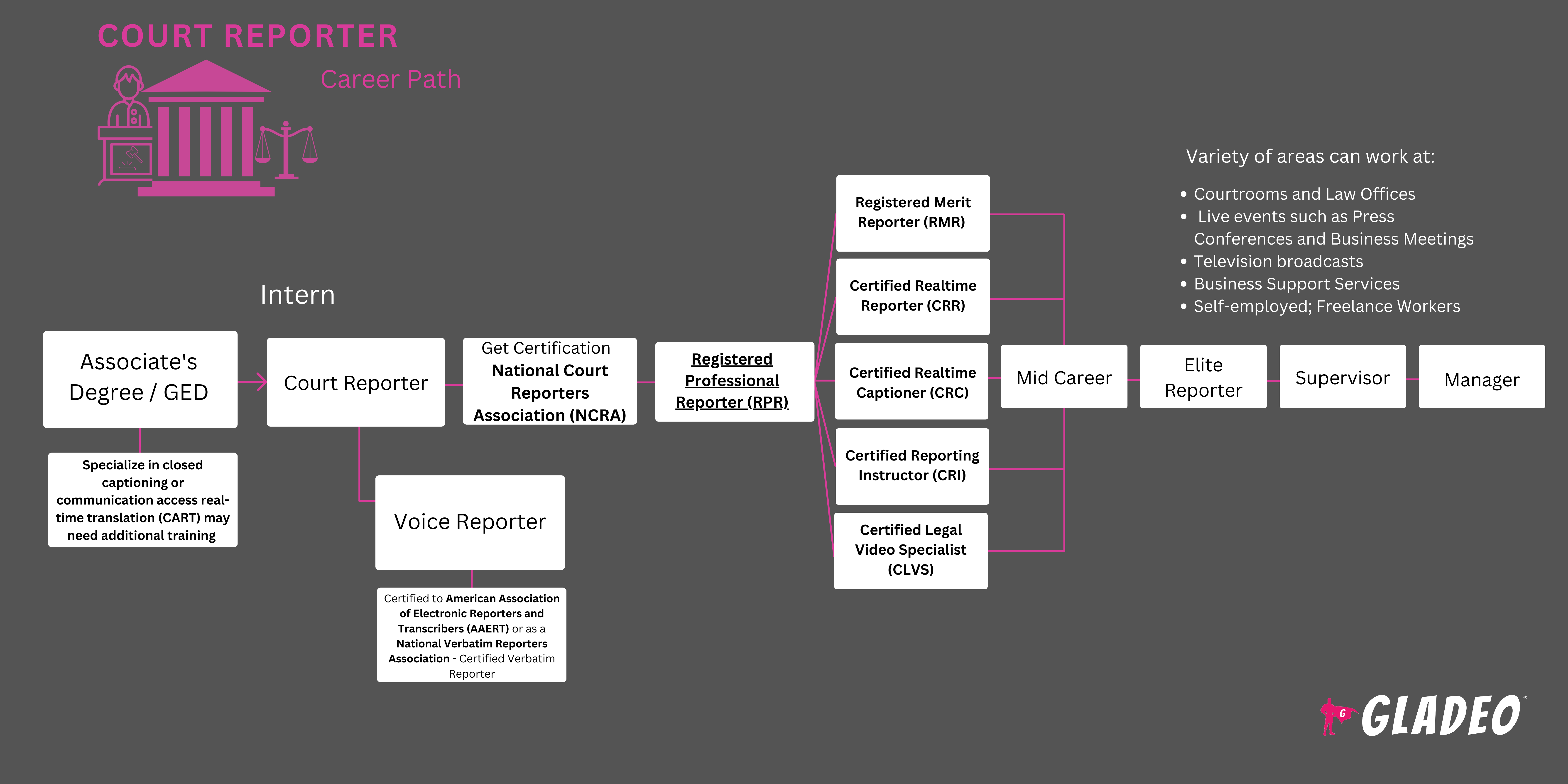聚光灯
类似标题
注册速记员 (CSR)、法庭监控员、法庭记录监控员、法庭速记员、证言记录员、数字法庭记录员、官方法庭记录员、实时法庭记录员、速记员、同声传译员
工作描述
我们大多数人都从电影和电视节目中了解法庭运作的基本情况!但您是否知道,根据美国法律,每次开庭都必须由法庭记录员 "逐字记录"?法庭记录员使用速记机等设备记录法庭开庭中发生的任何法律程序中的每一句话。
这些记录誊本必须详尽、完全准确,因为律师和法官经常会参考这些记录誊本。誊本还包括索引、所使用的直观证物清单以及对实物手势或行为的参考。虽然有些诉讼程序允许使用电子报告(即录音)或语音写作,但速记仍是首选方法,要求打字速度达到每分钟约 200 字。但法庭记录的职责也超出了法庭的范围,例如记录其他类型的法律程序、帮助整理记录以及回应请求。
职业生涯的回报
- 制作准确的法庭诉讼记录,供日后参考
- 了解法律系统的内部运作
- 作为美国司法系统的重要组成部分
内幕消息
工作职责
工作日程
- 正式法庭记录员是全职工作,但自由职业记录员可能只是兼职工作。
典型职责
- 在法庭开庭时,使用速记机、速记面罩录音设备或数码录音设备捕捉现场对话
- 从法庭播放的视频或音频记录中捕捉对话作为证据
- 协助记录取证、听证、会议、内庭诉讼、解散及其他程序
- 书面记录法庭上的手势、动作或情绪反应
- 必要时要求发言者作出澄清
- 应要求在法庭上回读部分记录誊本
- 跟踪诉讼过程中使用的视觉展品
- 审查和校对誊本;核实准确性并修正错误、错别字、拼写错误和不完整条目等。
- 为笔记和磁盘编制索引;存储记录誊本,并根据授权向经授权的律师、法官或公民请求者提供副本
- 将成绩单提交给相关的书记员办公室
- 创建供法官查看或签署的法庭命令
- 与可协助誊写编辑工作的誊写员合作,以及
额外责任
- 将信息输入相关数据库
- 遵守安全的记录管理归档政策
- 根据需要与其他法院工作人员合作,包括法官、律师、书记员、口译员和法警
- 更新软件或设备
- 了解最新的特殊术语
- 接听电话和收发电子邮件
- 通过继续教育和考试保持专业认证
工作中需要的技能
软技能
- 积极倾听
- 注重细节
- 浓度
- 独立的
- 监测
- 有组织的
- 病人
- 可靠的
- 资源丰富
- 强大的沟通能力
- 时间管理
- 写作
技术技能
- 熟练使用速录机、速记口罩录音设备和软件(如HTH GoldenEar 语音写作系统和Nuance Dragon)以及数字录音/计算机辅助转录设备
- 速记知识
- 时间会计软件,如TimeLedger
- 法律数据库界面和查询程序,如Acclaim Legal
- 日常文书和行政职责,如记录管理
- 熟悉与审判室有关的适用法律和政府政策
不同类型的组织
- 业务支持服务
- 法院和立法机构
- 自营职业者;自由职业者
期望与牺牲
法庭报道有时会很累,压力很大,而且不容许出错。记者必须能够长时间静坐并集中精力,现场捕捉信息,逐字记录,不出差错。对于自营职业者来说,可能需要花费时间和金钱来宣传服务并前往工作地点。这可能需要长途跋涉或在酒店过夜。当工作具有时间敏感性时,法庭记录员可能需要加班进行审查,以确保誊写的准确性。
当前趋势
从事这一职业的人在年轻时喜欢做什么样的事情......
法庭记录员通常热衷于阅读,这是他们年轻时养成的习惯。他们可能在很小的时候就上过打字课,也可能通过写博客或故事来练习打字。有些人是看着电视上的法庭剧长大的,他们希望在现实生活中也能有这样的经历!
需要的教育和培训
- 法庭记录员不需要完整的大学学位,但大多数人都会在当地社区学院或职业学校接受证书课程或副学士学位的正规培训。
- 根据O*Net 数据,75% 的人拥有证书,12% 的人拥有副学士学位。5%的人仅有高中文凭就开始工作
- 普通课程侧重于速记、语法、语音、拼写、标点符号、词汇、速记机打字、医学和法律术语、解剖学、法庭记录程序、职业道德、字幕、笔录制作技术、法律程序和数字工具使用等主题。
- 学生必须努力使用速记设备提高打字速度
- 根据所学技能的不同,课程时间可长达两年或更长
- 有些计划提供学徒或实习机会,以获得真实世界的实践经验
- 希望专门从事闭路字幕或通信访问实时翻译(CART) 的学生可能需要额外的培训
- 新员工将接受几周的一般在职培训,以熟悉当地程序和常用术语。
- 有几个州要求法庭记录员获得执照或第三方认证才能工作
- 注意:学院或职业学校颁发的证书与第三方机构颁发的证书不同
- 法庭记录员认证由美国国家法庭记录员协会(NCRA) 提供。NCRA 认证包括
- 注册技能报告人(RSR)
- 注册专业记者(RPR)
- 认证实时报告员 (CRR)
- 认证报告指导员(CRI)
- 注册法律视频专家(CLVS)
- 语音记录员是法庭记录员的一种,他们使用自己的声音进行 "写作",对着录音口罩或语言消音口罩说话。语音记录员可获得美国电子记录员和誊写员协会(AAERT) 的认证,或美国逐字记录员协会-认证逐字记录员的认证。
- 上述所有认证都要求通过笔试和硬技能测试,要求打字、转录或录音的字数达到最低要求。还必须达到最低准确率
- 必须通过继续教育课程定期更新证书
- 每个州都有自己的要求。有些州接受上述第三方的认证来代替州考试。详情请咨询各州的司法机构!
- 并非所有州都要求执照,但雇主仍可能希望看到第三方认证证明
在大学中需要注意的事项
- 法庭记录员不需要上大学,但可以完成社区学院或职业学校的证书或课程
- 了解该计划是否与当地雇主有合作关系
- 决定你是在校内、网上,还是通过混合方式(即两者的混合)参加一个项目
- 寻找学校赞助的奖学金、私人奖学金、联邦或州助学金以及其他经济援助机会。使用 FAFSA 申请联邦学生补助,查看您有资格获得哪些补助
高中和大学里的事情
- 在高中阶段,法庭记录员应努力学好所有英语课程,以及生物、信息技术和打字课程
- 申请兼职工作、实习或学徒,以获得实际工作经验
- 通过Stenovate和其他网站进行范围界定和校对练习
- 联系在职的法庭记录员,申请一次信息访谈。许多人都会很乐意与您谈论这份工作!
- 参加公开审判,观看诉讼程序并了解预期情况
- 提前查看当地的招聘信息,了解最常见的申请要求
- 决定您是想获得证书还是副学士学位,以及您是想亲自上课、在线上课,还是两者兼而有之
- 考虑一下您是想专注于速记还是语音写作,以及您是否有兴趣学习如何制作闭路字幕或通信访问实时翻译(CART)
- 了解您是否对某一特定领域感兴趣,例如医疗案件或刑事审判报道
- 一些雇主可能更愿意聘用国家法庭记录员协会认可的法庭记录课程的毕业生
- 查看不同的第三方认证选项。看看您有资格获得哪些认证,并在准备就绪时将其提交!
典型线路图

如何找到你的第一份工作
- 确保您符合所在州的执照要求(如适用
- 扫描常用的招聘门户网站,如Indeed.com、NCRA 的招聘栏、美国法庭记录员协会的招聘栏以及当地法院的网站。
- 寻找实习或学徒机会以及职位空缺
- 确保您拥有符合招聘职位要求的证书(例如,NCRA 的注册专业记者证书)
- 在LinkedIn个人档案中更新您的法庭报告技能和学术成就
- 考虑加入可以建立联系的专业组织。法庭记录是一个相对较小的职业领域,一般来说,85%的工作都是通过网络找到的。
- 与您的培训项目经理或学校的就业中心联系,了解他们是否与法院或其他招聘毕业生的法律实体有联系。
- 如果您居住在小城镇或农村地区,没有很多法庭记录员的工作机会,请考虑搬迁到较大的城市
- 熟悉该领域的法律术语,以及与您将处理的案件类型相关的专业词汇(例如,用于报告的医学或法律术语)。
- 查看法庭记录员简历模板,了解格式和措辞方面的想法
- 按时间倒序列出你的工作经历,确保每个要点都能说明你的成就所产生的影响
- 在简历中添加相关关键词,例如
- 法庭诉讼
- 法庭诉讼
- 法律术语
- 诉讼
- 转录
- 如果可能,请附上您每分钟打字速度 (WPM) 和准确度的证明
- 请描述您在听证或审判等法律程序的誊写和处理方面的经验
- 与以前的主管或老师交谈,询问他们是否愿意作为个人推荐人。在把他们列为联系人之前,先征得他们的同意。
- 学习法庭记录员面试问题范例,始终为面试成功着装
- 与朋友一起做一些模拟面试练习。想好如何回答问题,比如 "如果你在誊写时出错,你会如何纠正?
如何爬梯子
- 根据雇主的不同,您在找到一份法庭记录员的工作后可能不会有太大的晋升空间。
- 总是准时到达,随时准备集中精力。法庭记录员的勤奋和可靠性深受信赖
- 与上司讨论加薪和晋升机会。让他们知道你愿意根据需要寻求额外的认证或教育
- 如果你有证书,就去攻读副学士学位。如果您拥有第三方认证,那么就去获取一个新的认证,它可以拓展您的技能,让您有资格从事更多的工作。
- 学习该领域的专业术语,扩大词汇量,这样当你听到别人大声说这些词时,你就会熟悉更多的词
- 与律师、法官和工作人员高效合作。他们可以为你说好话!
- 不断提高速记打字速度和准确率
- 熟悉最新的技术进步,如人工智能软件
- 研究行业杂志,参加专业组织的活动,在这些活动中您可以拓展人脉,学习新知识!
推荐的工具/资源
网站
书籍
- 完整的法庭记录员手册和实时写作指南罗伯特-麦考密克(Robert McCormick)、玛丽-克纳普(Mary Knapp)等著。
- 法庭记录员常用词和短语参考》(The Court Reporter's Reference of Common Used Words and Phrases作者:肯尼斯-维克
- 莫森的《法庭记录员英语指南作者:Lillian Morson
B计划
法庭记录员工作压力大,体力消耗大,因为需要长时间保持静止姿势,在小型机器上打字。这是一个相对较小的领域,因此在许多地区工作机会可能有限。但是,如果您喜欢行政或文秘工作,下面的一些类似职业值得考虑!
- 行政助理
- 文书事务员
- 法院、市政和执照办事员
- 口译员和笔译员
- 法律秘书
- 医疗转录员
- 律师助理和法律助理
新闻联播

特色工作

在线课程和工具







